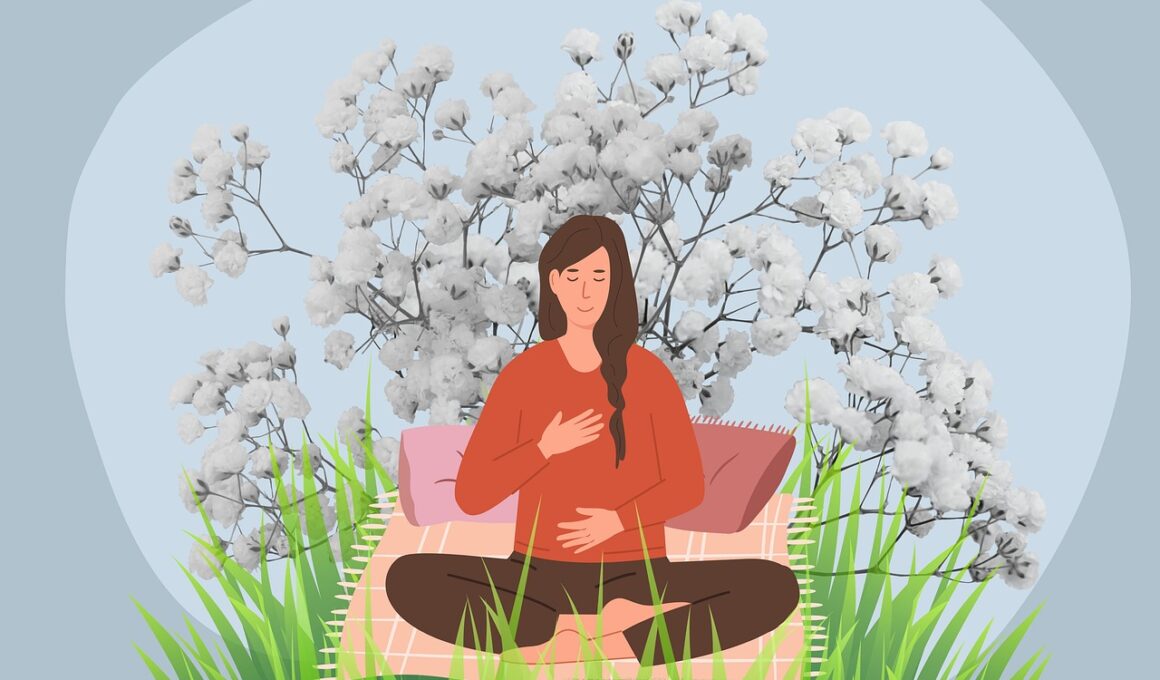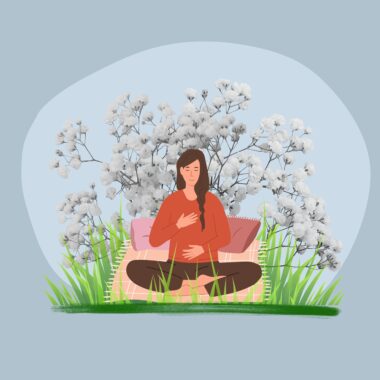Breathing Exercises That Boost Mental Clarity and Relaxation
Breathing exercises are powerful tools for enhancing mental clarity and promoting relaxation. Engaging in mindful breathing practices can significantly reduce stress levels, enabling individuals to experience heightened focus and tranquility. Breathing techniques, such as diaphragmatic breathing, can harness the breath effectively, fostering a sense of calm during anxious moments. By being intentional about how we breathe, we can influence our mental state positively. In today’s fast-paced life, integrating a few moments for deep, soothing breaths can have transformative effects on our overall well-being. Utilizing these breathing methods can be beneficial not just for stressed individuals but also for anyone looking to improve their mental health. Therefore, it is essential to explore various breathing techniques that suit different needs and preferences. Practicing these exercises regularly helps to cultivate mindfulness, which aids in reconnecting with the present moment. Ultimately, making breathing exercises part of your daily routine can lead to significant improvements in both mental clarity and relaxation.
One particularly effective method is the 4-7-8 breathing technique. This technique involves inhaling deeply through the nose for a count of four, holding the breath for a count of seven, and exhaling slowly through the mouth for a count of eight. It encourages relaxation and has been shown to help reduce anxiety levels significantly. Another simple yet effective exercise is abdominal breathing. To practice it, place one hand on your belly and another on your chest. Focus on breathing deeply through the diaphragm, causing the belly to rise and fall. These exercises can be practiced anywhere; they require no equipment, making them accessible and easy to incorporate into daily life. Also, practicing box breathing can cultivate focus, particularly useful during stressful situations. Engage in equal parts inhalation, retention, exhalation, and holding the breath to balance your body and mind. Each technique can be adapted to personal preferences, providing flexibility in how breathing exercises are utilized. Regular practice of these methods can contribute significantly to overall mental health and resilience against stress.
Additionally, practitioners often find peace through mindfulness meditation, where breath awareness is integral. During such practices, focusing on each breath helps clear the mind and promotes relaxation. One engaging way to deepen this awareness is to visualize the breath as a wave, flowing in and out naturally. This imagery serves to reinforce the feeling of calm while simultaneously cleansing the mental space. Combining visualization with breathing exercises can heighten their effectiveness, leading to improved emotional regulation. Research indicates that consistent practice of mindfulness techniques leads to lasting changes in brain structure, increasing areas associated with emotional control and decrease stress levels overall. It’s fascinating to note how a practice as simple as mindful breathing can have profound neurobiological benefits. It invites individuals to reconnect with their inner self and promotes a healthier response to stressors. As we delve deeper into understanding how our breath affects our mind, we can tailor our approaches and find what truly resonates with our individual experiences. Such tailored approaches can lead to well-rounded stress management strategies.
Integrating Breathing Techniques into Everyday Life
Integrating breathing techniques into everyday routines can remarkably enhance emotional well-being. To incorporate these practices seamlessly into daily life, you might designate specific times, such as during morning rituals or before bed. By setting reminders or associating these exercises with routine activities, such as commuting or eating, consistency is easily achieved. Another beneficial approach is practicing breathing exercises during transitions, such as taking a moment to breathe deeply before entering meetings or dealing with challenging situations. Create a calming environment that encourages relaxation and mindfulness; even a few minutes of focused breathing can have impactful results. Engaging in these exercises during breaks at work can relieve stress and improve concentration when returning to tasks. Remember that these moments of mindfulness do not need to be lengthy; even short sessions can be incredibly effective. Developing healthy breathing habits contributes significantly to managing stress long term. As you become more accustomed to these practices, your body will naturally activate the relaxation response, making it easier to approach daily challenges with clarity and composure.
It’s important to be patient with yourself as you explore these methods, recognizing that stress management is an ongoing journey. Everyone reacts differently to various techniques, making it necessary to experiment until you find the perfect fit for your unique needs. Track your progress and observe how particular exercises influence your stress levels and mental clarity. Over time, you may discover specific exercises that work best for you during challenging moments. Journaling can be an excellent way to document these experiences. By reflecting on different techniques, you’ll be better equipped to make informed decisions about what to continue practicing. You might also consider participating in workshops or classes that focus on breathing techniques and mindfulness. These settings provide guided instruction and support from experienced practitioners. Embracing a community focused on stress management can foster a sense of connection and encouragement. Ultimately, the key to successful breathing practice lies in consistency, patience, and a willingness to adapt your routine to suit your lifestyle effectively.
Benefits of Regular Breathing Exercises
Regularly practicing breathing exercises yields numerous benefits, enhancing not only mental clarity but also physical health. By reducing stress hormone levels, deep breathing fosters an overall sense of calm, allowing individuals to think more clearly and objectively. Improved oxygen flow to the brain enhances cognitive functions, leading to better decision-making and problem-solving abilities. Research shows that individuals engaged in consistent mindfulness and breathing practices report reduced levels of anxiety and depression. These techniques can also lead to lowered blood pressure and improved cardiovascular health over time. Importantly, deep breathing acts as a natural analgesic, alleviating tension headaches and muscle pain. Furthermore, respiratory exercises can help boost your immune system, preparing your body to better cope with external stressors. Engaging deeply with your breath enhances emotional resilience, allowing for more grounded responses to life challenges. Therefore, dedicating yourself to regular practice not only serves to mitigate stress but contributes to a more vibrant and healthy lifestyle. Embracing these benefits will undoubtedly transform your approach to stress management and daily living.
In conclusion, incorporating breathing exercises into your life can significantly improve mental clarity and relaxation. The variety of techniques available allows individuals to personalize their approach to stress management, finding what feels most comfortable and effective. By integrating these exercises into daily routines, tracking progress, and embracing community resources, anyone can develop a sustainable practice that meets their needs. Breathing is a powerful tool available to all, requiring nothing except focus and intention. As you explore the world of breathing techniques, allow yourself the space to grow, experiment and adapt, cultivating a valuable resource for mental health. Understanding how breath influences our emotional states promotes a fuller appreciation of our mind-body connection. Take the first step today towards discovering how breathing exercises can support your overall well-being. Remember that patience is a vital virtue in cultivating lasting change. Create a plan to regularly engage in these techniques, periodically revisiting them and allowing for flexibility in your practice. In doing so, you empower yourself to face life’s challenges with clarity, resilience, and an unwavering sense of calm.
Final Thoughts on Breath and Well-being
Embracing the practice of breathing exercises holds a pivotal place in the landscape of stress management. As you unlock the transformative potential of your breath, consider the multiple benefits of making it a routine part of your life. Through effective application of various techniques, deep, calming breaths engage the body’s parasympathetic nervous system, further enhancing relaxation responses. The ability to remain aware of your breathing coupled with intentionality creates profound changes within, ultimately leading to improved mental and emotional clarity. Integrating these exercises can foster deeper connections with oneself, encouraging a more nurturing relationship to stresses. As stressors arise, you’ll possess essential tools for managing your immediate reactions, leading to a healthier mental state. The practice of focusing on breath builds capacity for gratitude and presence in your life. So, embark on this journey of inner peace where breathing becomes a revered practice rather than just an automatic response. By refining this skill, you will enhance mental acuity and overall well-being, propelling you toward a more conscious, fulfilling life.





